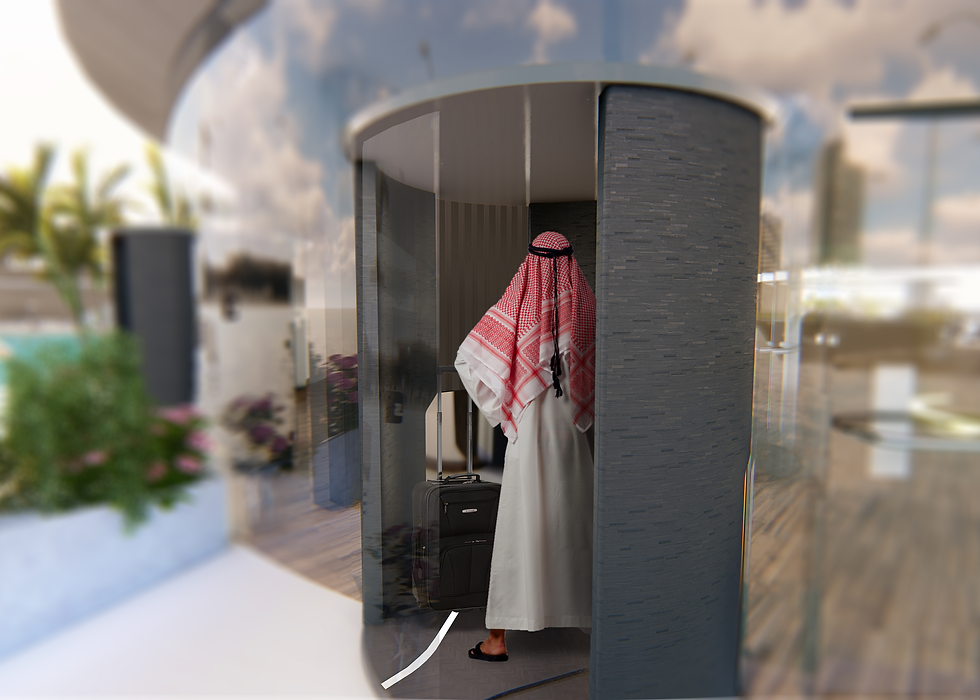 |
|---|
By 2020, the ride-sharing giant Uber plans to have its first public demonstration of a new mode of transportation that will fly passengers to their destinations. The company has organized a new branch called Uber Elevate and is betting that eVTOLs (Electric Vertical Take-Off and Landing) will become second nature to busy commuters and provide a convenient alternative to wasting hours stuck in bumper-to-bumper traffic.
*Project presented in May of 2018 at the Uber Elevate Summit in Los Angeles, California.
This project was completed in December of 2017 as part of a sponsored studio course with Uber Advanced Technologies Group at ArtCenter College of Design. I participated in a group of 5 where my main role was vehicle exterior and interior design.
Team members: Geemay Chia, Ajay Menon, Astha Vagadia, Thomas Wibowo

A Comprehensive Experience
My team of 5 students was asked by the Uber Elevate division to explore a broad scope of what the entire Uber Elevate experience could be in Dubai. This included aspects such as reserving a flight and app design, skyport layout and design, security measures, and aircraft design (exterior and interior).

Smartphone interface allows users to easily navigate the process of reserving a flight and getting to the vertiport.

A revolutionary mode of commuting requires a new type of terminal to facilitate a holistic system.

While entering the vertiport, each passenger is scanned and weighed for security and safety reasons.

Prepare for boarding by organizing in your respective loading zones.

Pick up a quick snack before or after your flight!

Modular Vertiports allow for quick expansion as demand increases through the years.

Aircraft Design
A futuristic form of commuting requires an entirely new mode of transportation. Based in Dubai, our new aircraft design had to consider the needs of the typical Emirati customer and the environment that they so frequently navigate. Aerospace engineering requirements also posed significant constraints such as weight and space.
Understand the Space
The engineering team required us to keep the interior as small as possible. To understand what we were working with and test theories, we built an accurate, full scale representation complete with seating to better understand the cabin interior.


In cruise mode, the aircraft is wing born and travels forward at an average speed of 150-200 mph thanks to the rear propeller. In take off and landing mode, the vertically oriented propellers will activate and allow the aircraft to perform just like a drone.

Loading and unloading passengers is a breeze with an automatic step that splits the distance from the ground to the cabin. Accent lights make sure you know where to step while providing a luxurious aesthetic.

The Dubai sun is hard to avoid but thin mesh back seats will allow maximum breathability and help passengers stay comfortable. Privacy blinds extend from the middle console and attach to the ceiling if a passenger isn't feeling talkative. Noise generated from the propellers require passengers to use the provided ear protection.

Passengers are able to stay connected and charged through onboard Wi-Fi and integrated charging ports in the middle console while breathtaking views of the city below are non-stop thanks to full panel windows on all sides. Cooling off is also a cinch with a/c nozzles for every passenger.

Normally, passengers store a backpack or briefcase under the middle console but if they have more than that, another seat can be used as overflow storage simply by sliding the seat cushion forward and folding it down against the seat frame.
Dimensions







Final Aircraft Design
The resulting concept beautifully complements the corresponding Vertiport. Features and styles are designed specifically for the Dubai market while simultaneously resonating the Uber brand aesthetic.